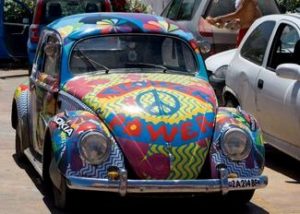 “I don’t want to move to Canada,” I said to my boyfriend Vic in 1967.
“I don’t want to move to Canada,” I said to my boyfriend Vic in 1967.
“I don’t want to move either, but I don’t want to go to a war I don’t believe in or go to jail.” Those were the choices.
“You’ll be 26 next year,” I said in a voice soft with hope. “Too old to be drafted.”
“That’s a whole year,” Vic said. “They drafted our friend Jeff and he’s dead. They took your friend Robin and turned him into a front line medic. Who knows what horrors he’ll see?”
We lay on our backs in the dark on Vic’s double bed. Rain drummed against the windows of his small apartment on Seneca Street. Streetlight reflections lit the unpaid bills on his desk. We were buzzed by the “Hell No, We Won’t Go Rally” we’d attended on the Cornell campus that day. A big metal trash can, filled with paper and dry wood, flamed amid a wild cheer. The boys and men walked forward one at a time to drop in their draft cards. Many signed a pledge.
“Hell, no! We won’t go.”
Our hope-filled ritual couldn’t save the young men from what came next if they drew a low draft number. A key campus organizer was drafted a few months later and chose jail. We’d seen others go to war, sometimes to their death but always to the end of innocence.
“So what can we do?” I asked. Vic always had ideas.
“I can’t think of anything besides Canada,” he said. “I think I can get in graduate school since I’m almost done with my course work, and I have relatives there. I’m sure I don’t want Vietnam or jail.”
“I’ll go anywhere you need to go,” I said. We’d had a close brush with jail earlier that year when we took medical supplies for South and North Vietnam across the border to Canada with a Quaker group. We knew then we wouldn’t choose jail if we could avoid it.
We hadn’t decided to marry, but were committed for life. “I’ll stay in graduate school until the government makes a move,” Vic said. “Maybe we’ll get lucky.”
“I’m ready to leave,” I said as I rolled toward him and touched his face. “I want to be with you.”
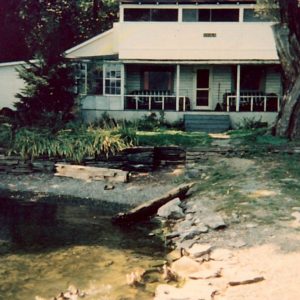 Vic drew a high draft number and didn’t get drafted or go to jail. We kept protesting the war in Ithaca, New York City, Buffalo, and Washington, DC, always grateful for our escape.
Vic drew a high draft number and didn’t get drafted or go to jail. We kept protesting the war in Ithaca, New York City, Buffalo, and Washington, DC, always grateful for our escape.
We moved to a beat-up cottage on Cayuga Lake after our May 1968 wedding and led encounter group weekends filled with free-wheeling psychological exploration and psycho-drama or acting out scenes with others playing roles of parents or lovers or teachers. Vic and I learned to be honest even about hard things.
We missed the Woodstock Festival on August 15, 1969 because we’d already advertised a group weekend and couldn’t cancel. I was secretly relieved. Even then, I didn’t love crowds, blaring speakers, and long bathroom lines.
“By the time we got to Woodstock
We were half a million strong
And everywhere there was song and celebration
And I dreamed I saw the bombers
Riding shotgun in the sky
And they were turning into butterflies
Above our nation
We are stardust
Billion year old carbon
We are golden
Caught in the devil’s bargain
And we’ve got to get ourselves
Back to the garden” ~Joni Mitchell, “Woodstock”
In Ithaca or at Woodstock, these were our people. This was our culture, our music, our lyrics. “We had to get ourselves back to the garden.”
***
How have you joined with others to make our world a better place? At heart, I’m still part of the Woodstock Generation. We didn’t fulfill our lofty values as we hoped, but it was the beginning of a conscious opening of my heart and a longing for peace, compassion, and nonviolence. For a few years, it all seemed possible. Maybe it still is.
For a post about our first anti-war protest with Quakers, see Make Love Not War: 1967. The last time I went to a large protest that wasn’t in my home state was January 2017. Vic would have been at my side if he were alive, but it was exhilarating to be there with good friends Jane and Roger and feel hope and solidarity with hundreds of thousands of others. I wrote about it in Giving Hope a Seat Between Anxiety and Grief: Women’s March on Washington. Let’s keep hope alive.
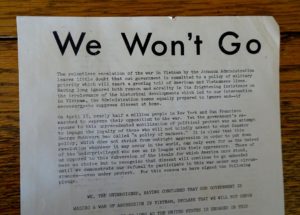
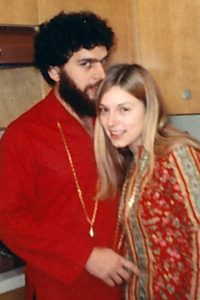
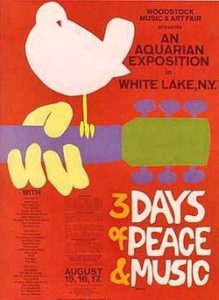
Well, thank goodness Vic didn’t have to go to jail, Canada or Vietnam! I do enjoy reading the rich, abundant stories of your lives together Elaine and wow! … those group weekend workshops sound most intriguing. It felt biblical to read, wherever Vic goes, there I go too!
Joni’s lyrics “and they were turning into butterflies” caught my eye and I couldn’t help think about your beloved Monarchs and how after release they fly home at the end of season and commune with thousands of others in Mexico … like their own annual, Woodstock festival!
Yes, I’ve seen the videos of them sitting, singing and dancing with other like-minded souls. Beautiful! And the fact that you’ve chosen to write about the cathartic 1960s is definite proof (if any is needed!) that at heart you’re still a liberated, free-spirited soul and always will be!
Wonderful writing, truly heartfelt my dear friend and some lovely family photos as always! My favourite group ever has been my Jungian Dream Group which lasted for ten precious years. A deep, mid-life transformation that woke up my soul! Warm autumnal blessings, Deborah.
Those encounter group weekends and trainings we did in California were life-changing. I was that in love that I would follow him anywhere, but decisions were always mutual and we were in complete agreement about politics from the first day we met until he died. I loved that butterfly line, too, Deborah. I always have. Joni Mitchell didn’t make it to Woodstock either, but still wrote the defining song. I got the idea for this piece from a discussion about draft resistance and Woodstock with a Facebook friend. It was a challenging time for so many of us but there was hope. May that hope still be with us in hard times for your country and mine.
Because hearing challenges, I haven’t gone to the yearly dream weekend with Robert Bosnak for a few years. I just signed up to attend in November. It may be challenging, but I’ll give it a try. I do dreamwork with a Jungian therapist, but a group is a different experience. May you have rose-colored apples and flower blessings to see you into October.
Mennonites have been conscientious objectors to war. The bylaws did not permit participation in the military in the 1950s or 1960s. It doesn’t now. My dad did not participate in World War II though as Hitler grew stronger, he and his father Henry did contribute metal to the war effort to defeat Hitler.
My Mennonite brother-in-law with my sister moved to Canada to live close to relatives, but he was called out anyway and served as an orderly in a hospital somewhere in the States.
Cliff was a divinity student at the time of Viet Nam and had a classification (4D?) that reflected that. I doubt he would have “made the cut” in those days anyway as he had asthma then and other serious allergies. Woodstock was not part of my experience though I espoused many of their values. Even now I support the Peace and Justice initiative of my alma mater, Eastern Mennonite College.
I too long for peace, compassion, and nonviolence. Practicing kindness is my modus operandi increasingly so as I grow older. I believe I’m part of a “movement” in the blog world here and on other sites, that promotes LOVE, not WAR!. Great topic, Elaine!
Thanks for sharing your Mennonite history and personal experience, Marian. It was important that my first antiwar protest was with Quakers who gave us lessons in nonviolence and ways to maintain inner peace when physically threatened. And we were threatened! A nonviolent approach worked for me then and it still does. Thank you for supporting peace and justice in so many ways. I know those are deep values for you from reading your stories about family history. Feed the hungry. House and clothe the refuge. I know you’re part of the movement promoting love which we need to remember and honor every day. May there be peace in this wild world. And speaking of wild, may your area of Florida and the east coast be safe from the wrath of Dorian. It’s hard to digest what’s happened to the Bahamas and we’re only getting the first reports.
There is sweetness and sadness when we think of the past, and who we were and the values of our youth .( I was too young and in the wrong country to be part of the Woodstock generation, but saw the film in a little theatre in grimy industrial Lancaster. I still tingle when I think of Richie Havens opening set) All these years later it is sad to think that the vision for the future we had turned into the world we have today.As we get older we have so many more layers and our values can become deeper . I tell people that over the years the epitaph I wanted on my grave has changed . In my youth the words would be simple and to the point “Fuck You!!!” as I became more philosophical it became ” Here lies GB, a castrated anarchist, the things I could have done if only I had the balls” these days I thought ” At least I tried” is more appropriate.The fact that there are so many of our former companions who are no longer here, makes it so important that we keep on trying, whether we succeed or not. I hope you are well and the op has been successful. Best wishes, Gary
Thanks for reflections, Gary. I read that having Richie Havens on first at Woodstock wasn’t planned, but whoever was scheduled then got stopped by traffic or the police and arrived late. I have not been heroic like some about peace protest, but I’ve been consistent in my beliefs and acts. I can look back and say I showed up and I still do. Sounds like you’ve done the same. Yes, we tried, but we were/are up against systems that find war and violence lucrative. Will this turn in the United States? I don’t know after more mass shootings and school violence. Still, I trust those values are not dead. Sometimes they go underground and the shadow takes over for a while. Sad to say, my hope for governments to do anything about climate change is wobbling. I do my small part locally on this land, but it has to be a huge cultural movement which faces the danger we’re in.
The operation was successful in that I hear much much better. It’s a demanding neurological adjustment as the brain processes bionic sound, but I took the summer to rest, recover, and raise Monarchs. I’m not completely recovered, but I’ve learned what I can and can’t do. Lots of sleep, time in nature and extreme caution with noisy or stressful environments. I’m beginning to enjoy some kinds of music which is a wonderful bonus I didn’t expect so soon. Best to you.
I’d like to see those who make these plans to go to war, to be in the frontline physically facing the enemy. Not behind their huge desks in war rooms. Patriotism is often misplaced, sometimes not. Yes, I’ve joined in protests. South Africa is the land of protest. Soooo many going on now, often violent and extremely destructive with a criminal element thrown into the mix. Too dire for words ..
I’ve always felt the same way about those who make war decisions, Susan. I think many of us do. These politicians who have not participated in war are quick to send others into danger, although almost never their own family. I’ve never felt endangered at a protest–and when things get violent such as when tear gas was used to dissipate protesters at the Pentagon in the 1960s, I was there, but not in the front lines. As volatile as political action is in the USA, I know it’s nothing like South Africa or what’s happening in Hong Kong and many other places. I will forever honor the message of Martin Luther King.
Absolutely wonderful.
Thanks, for your experience.
Cragar
Thank you, Cragar. As you know, our conversation was the inspiration for this piece. Those values stuck like glue.
thank you so much, love your writings
Thank you, Jackie. Those basic sixties values stuck with me.
My brother and his wife did move to Canada and had a good life up there. They came back when we got out of it.My husband was already in the National Guard. NO problem there. One day when his company were called to be at a protest nearby to keep things “safe” he told them he had go home to get his “Peace Button.” They told him he couldn’t go to the protest. Hah!
If I were Not in my late seventies now and had a knee that wasn’t hurting, I’d be doing something right now about climate change. So I donate and sign petitions instead.
I was a hippie back then and still am. Peace be with us!
Here’s to hippie-power, Joan. We still find ways to show up in writing, in donations, in petitions, in being politically active. Until cochlear implant surgery, I went to many protests and I’m almost ready to try that noisy world again. The trick is to go with a friend I can follow around, remove my audio receiver, be deaf and give up trying to hear the PA system speeches. They’re important, but I can often read them later. It’s time for the younger ones to step up on their strong knees, and they’re doing it.
Love this post Elaine. The world could use a little Woodstock for sure now. Sorry you didn’t get there. I think it would have been fabulous, I was a bit too young, lol. Glad to hear Vic wasn’t drafted, and makes me wonder just how many flew to my country Canada to avoid the draft. 🙂
Thanks, Debby. A few people I know went to Canada in the sixties because of the draft and many more I didn’t know. As things have developed recently in my struggling country, I still think it might have been a good idea. But now I’m rooted here and my sons and community are here and the land. I’ve always admired Canada. I know it’s not perfect. There are environmental issues and problems with the rights of indigenous people just like here, but it’s always felt like a civilized country to me.
Those days have touched my life in two life altering ways. I married my first husband in 1980. He had grown up in a pacifist church and both of us opposed the VietNam war and the draft. A year later, he was assigned a low draft number and ordered to report. He filed conscientious objector status for spiritual reasons and was given a temporary reoriev contingent upon working in n a war supporting community service job in a hospital. A few months later, he couldn’t reconcile the compromise and mailed in his draft card announcing his unwillingness to cooperate. In the two years of stress that followed, he dropped out of college. I finished my degree. Birth control meaures failed and our son was born in 1973. My husband lost himself in marijuana and depression. I left in 1975 and we divorced. I moved with our son to the west Coast be near to my family. I met my second husband on a plane in 1977. He was a LTC officer in the Navy and a Viet Nam vet. I learned how that war damaged those who served there areand were traumatized and regretted their choice. We married and have been together 39 years. I have experienced both sides of the VietNam war to men I love. My son refused to register for selective service and it has limited his rights to education but I am very proud of him. As a psychotherapist, I have ironically worked with active duty military members and their families and have become educated and fluent in the concept of moral injury incurred in combat…the spiritual crisis of those who make “Sophie’s choice” split second decisions and regret them at a soul deep level. There is no win in a war, in a combat situation. I only hope that those I have had the privilege to be with and witness their souls wounds have had a moment of grace through my presence and words. I hope for healing for each of us who survived that era. May we al do whatever we can to resist it happening again. Namaste.
Thank you for sharing your powerful experience with such compassion and beauty, Suzanne. Even during the war, I didn’t demonize those friends or strangers who went to Vietnam and I learned later about the psychological damage they endured–although not from anyone extremely close to me or in my family. I see the same kind of damage now in those who have long deployments in the Middle East. I honor them for going but they often pay a terrible price for a truly unwinnable war. I wish they would all say, “Hell No. We won’t go.” I know it’s hard to make that choice for many. Impossible even.
You are on the front lines with your therapy work and must be able to help people in unique ways because of your personal experience of both sides. I agree there is no win in a war. My dad was in WWII and joined the Merchant Marines because he didn’t want to kill anyone–but he spoke of the broken boys who were shipped to the US on the boats that had dropped off supplies. They were kids conscripted in the German Army who were way too young to be soldiers. There was no way for my dad to protect himself from the psychological carnage he saw even if he avoided combat. His health was ruined by those four years at sea.
Thank you, Elaine, for another wonderful post.
Linda and I came to Ithaca in 1972 for a social change project, a Community of Communes and Not-For-Profit businesses. I came to set up the alternative school for the project. We still live on the land originally owned by the group, and are still part of a land coop, all of which grew out of the drive to make our society more environmentally aware and economically humane. The Community project didn’t last very long, but it has deep roots in me. I did wind up teaching in 2 different alternative style schools in this geographic area.
As others said above, what is happening today is frightening and seems like a manifestation of what we tried to fight back then. And just as Vic and your own life or freedom were at stake for a while then, we have to do all we can so our lives and freedom are no longer threatened today. May we be successful!
Thank you, Ira. I knew about your teaching background in alternative schools, but not about the commune attempt. Vic and I worked with a group that had a commune plan in 1968, but ran into personality conflicts and control issues so didn’t go in that direction. It takes dedication! Around that time, I worked for Ithaca Neighborhood College (a free university) in the Dewitt Building for a year or two, but then the city had other plans for the Dewitt Building. Watching younger generations step up about climate change issues is heartening. It’s hard not to fall into despair. We’ve left them such a mess, so I agree that, as long as we can, we have to help find any possible solutions.
This was such a wonderful post, Elaine. Yes, here’s to hippie power! I was just coming of age at the tail end of the Vietnam war, though I remember my best friend wearing a black armband to school every day. It was lovely to read about your and Vic’s relationship/commitment to one another at that time, and that picture of the two of you in 1967 is beyond beautiful. (I wonder what is at the end of the gold chain that he is wearing.) As you wrote above, it is hard not to fall into despair at the state of our world, and yet essential to keep doing what we can, including your nurturing the life of so many new monarch butterflies!
Thank you, Anne. Do you need a laugh? At the end of that gold chain? A little tinkling bell. An “in” ornament in 1967 when the photo was taken. I gave it to Vic for Christmas along with the red shirt I’d made. In this photo, he’d just asked me to marry him (a surprise!). He wasn’t much interested in hippie costumes, much as I tried to convince him. I remember him saying the bell made him feel like a cat and I don’t think he ever wore it again. He was soon back in khaki pants and hiking boots. The beard lasted about a year more, until he returned to shaving and shorter hair. That didn’t change his politics, but suited his temperament. Bravo to your friend who wore a sign of grieving during that misbegotten war. Let’s be grateful for granddaughters and butterflies and whatever helps us hold on to joy and hope.
Oh, Elaine, this did make me laugh! And the fact that the picture was taken right after Vic asked you to marry him explains, perhaps, the absolute radiance of the two of you in that photo.